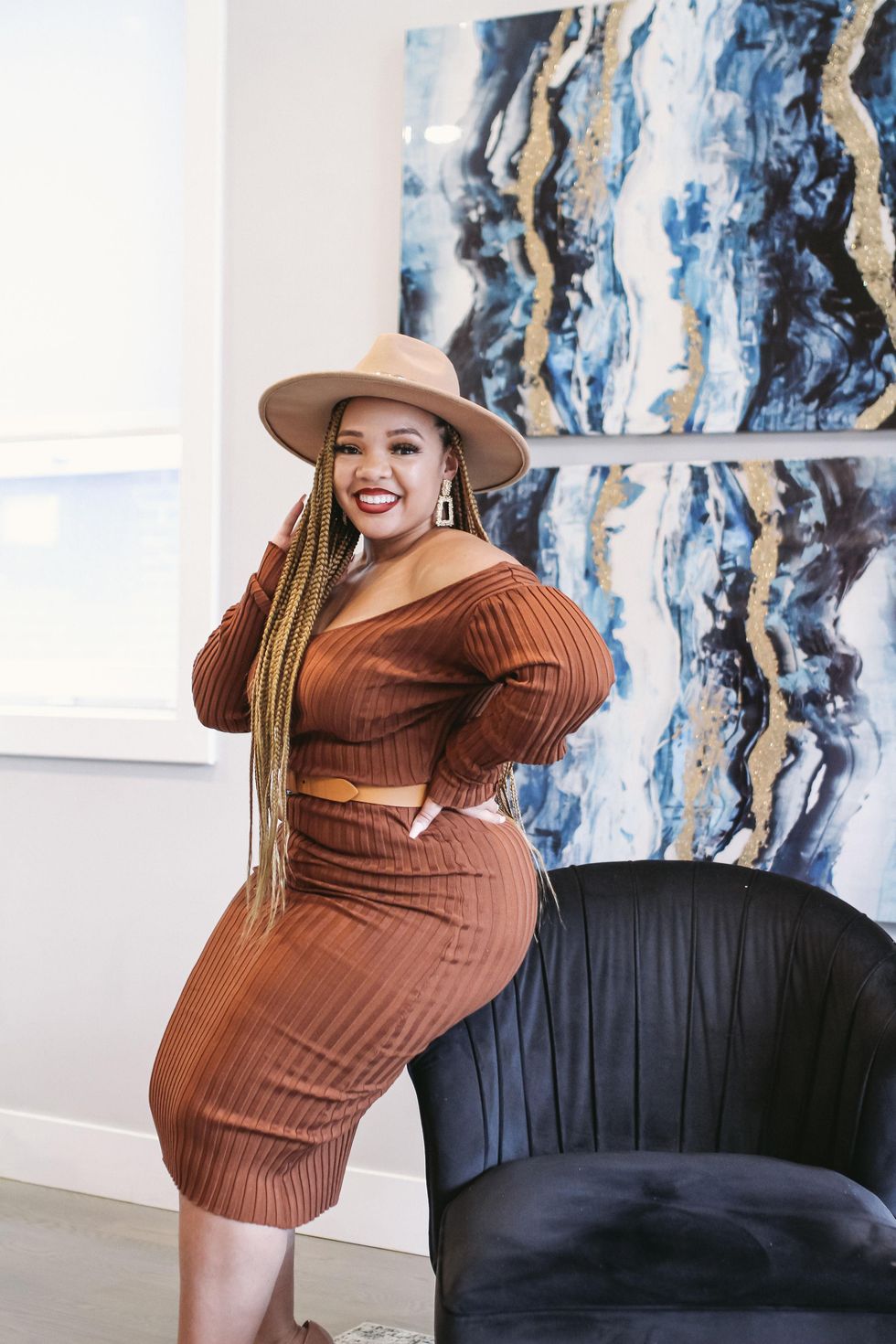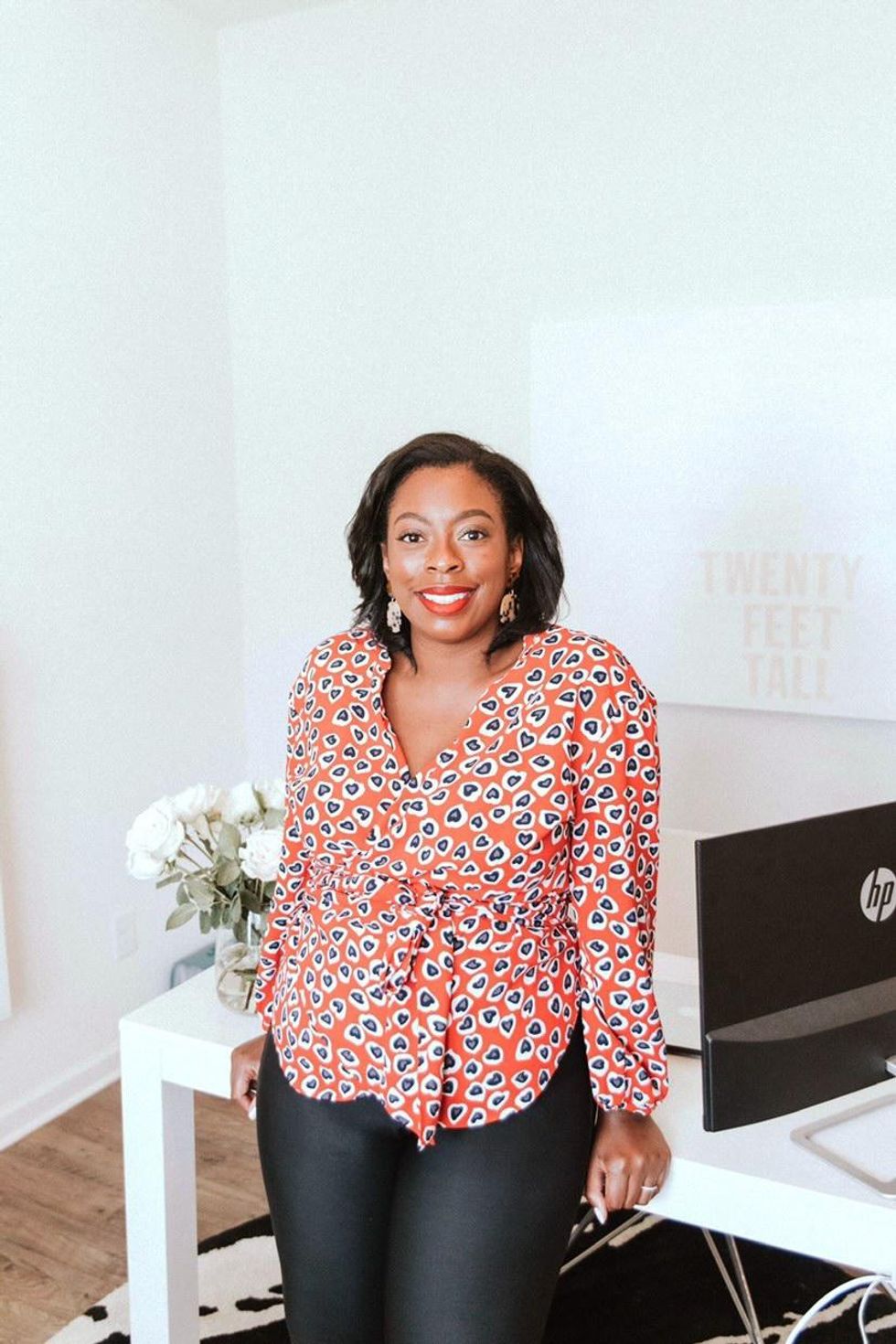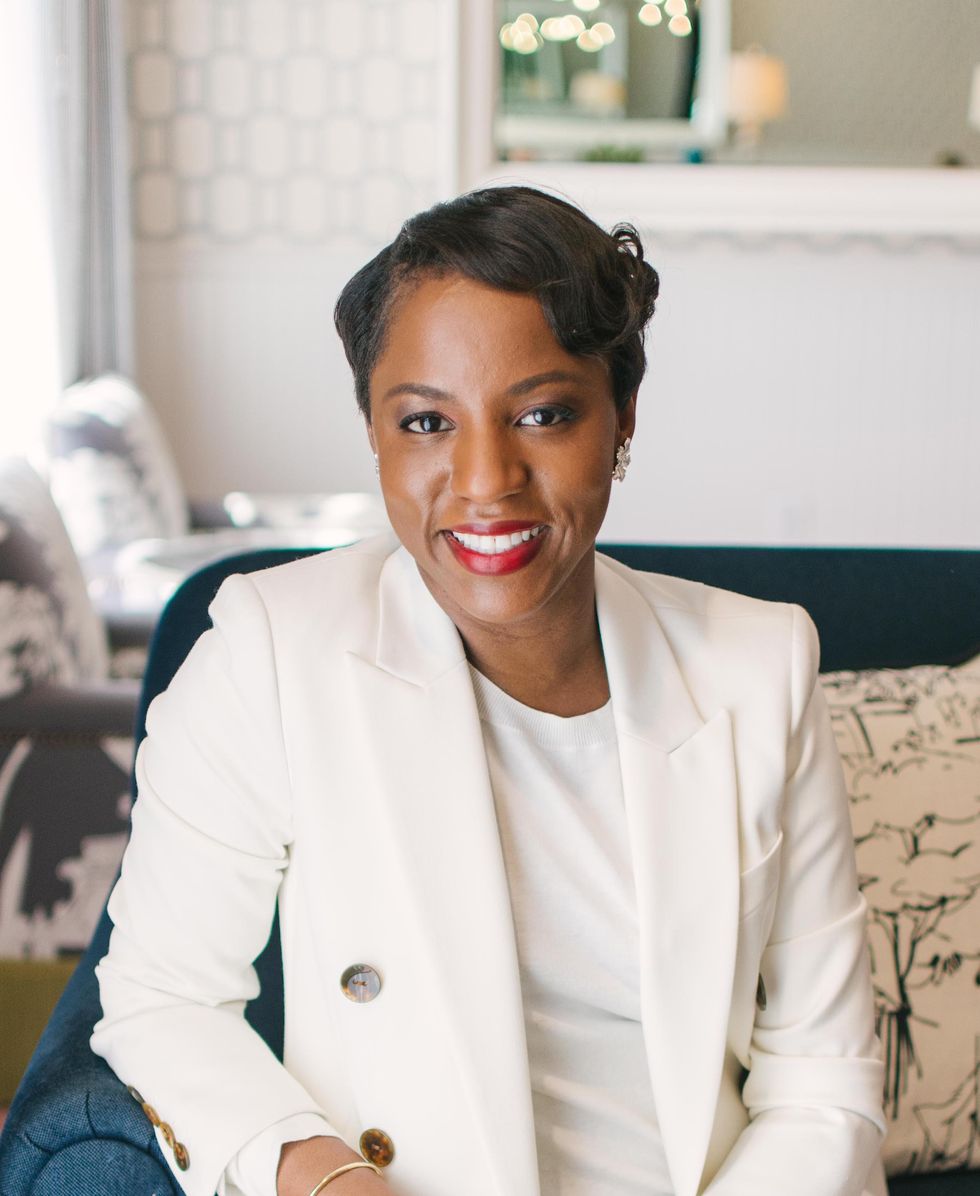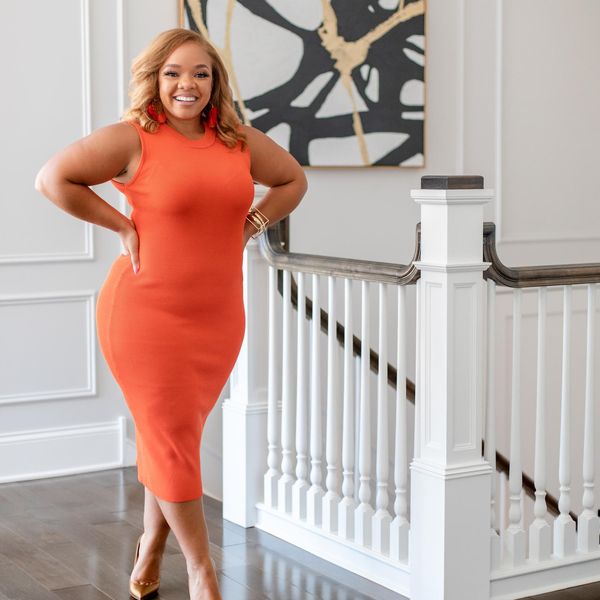
I think it's fair to say that most of us long to reach that place where the money resides, especially in the present times when life is so uncertain and people are likely to lose their jobs at any given moment. On the other hand, perhaps thanks to the plethora of entrepreneurs that document their journeys on social media, there's the sense that abundant financial wealth seems more accessible now than it ever has before. With that said, despite all the step-by-step guides to becoming rich available on the market, we can still hear the same question echoing in our heads: How do I get to the bag, though?
Well, apparently, it's in the mind, chicas. It all happens in our minds first.
The mind is a powerful tool that, depending on how we choose to use it, has the power to make or break us. This is a fact that the bomb business owners I had the opportunity to interview as part of this feature said to have learned the hard way while on the path to acquiring their Boss badges. The four ladies got real on the struggles that they've faced in the past which almost prevented them from becoming who they are today, the mindset shifts that helped overcome them, and more.
Befriending Fear To Unlock a World of Luxury
For the longest, I followed the 'American dream.' I studied mechanical engineering in undergrad, received my MBA by the age of 23, and transitioned into a job in Corporate America [and] began earning six figures. However, despite all the benefits of working that job, I knew after a little time that it wasn't what I wanted to do forever. Corporate America, I felt, deprived me of being the master of my own time. My time was theirs and I had little to no say on that.
Many times, I found myself wiping my tears because I had to work extra hours or on the weekends to complete the tasks that I was asked to do at the last minute, all while my personal life and loved ones were waiting on me. When September 2017 came, the moment finally came for me to reclaim my freedom. Although I was deathly afraid and almost talked myself out of it, I decided to quit my job and pursue my dreams.
Fear, I must say, is the companion that's been following me throughout this whole journey from giving up on a six-figure salary to building my own six-figure company. It's still there, to be honest, but I've learned how to tame it.
In the beginning, I feared wandering in the unknown. While we do know what we decide to walk away from, there's no certainty that what we'll find on our path will be any better. And then, once I became my own boss, the fear that my finances would never advance as much as my career did quickly took over me.
A year before taking this leap of faith, I launched Epic Fab Girl, "a community for women entrepreneurs who want to build profitable brands and grow their faith." The latter initially started as a blog but after I quit, I had to figure out a way to monetize it to generate revenues. On top of that, in January 2018, I launched my own marketing agency. I wanted to offer my target audience coaching services and digital courses to help them scale their businesses to six figures. Funny thing is, I was nowhere near earning such an amount of money myself, even after giving my business more than a year to grow and flourish.
While my clients were getting the desired results, on my end, I was struggling financially; I faced difficulties paying my bills, my car had been repossessed and I'd received foreclosure papers on my home as a Christmas present. Earning six figures has never been a requirement for me, but it was somewhat mandatory if I wanted to maintain the level of comfort I was living in. All of which ultimately had me contemplating [whether or not] to go back to Corporate America. However, while it's a move that my entourage encouraged me to make, I never received any signs from God that meant this was what He wanted for me. So, as a woman of faith, I continued walking the path that I was already on.
As soon as 2020 rolled around and the pandemic hit, that's when everything changed for the better. Within the first semester of the year, my revenues reached six figures for the first time—which wouldn't have happened had I decided to take some steps back or had I simply not shifted my mindset to believe that my services are worth the luxury price point.
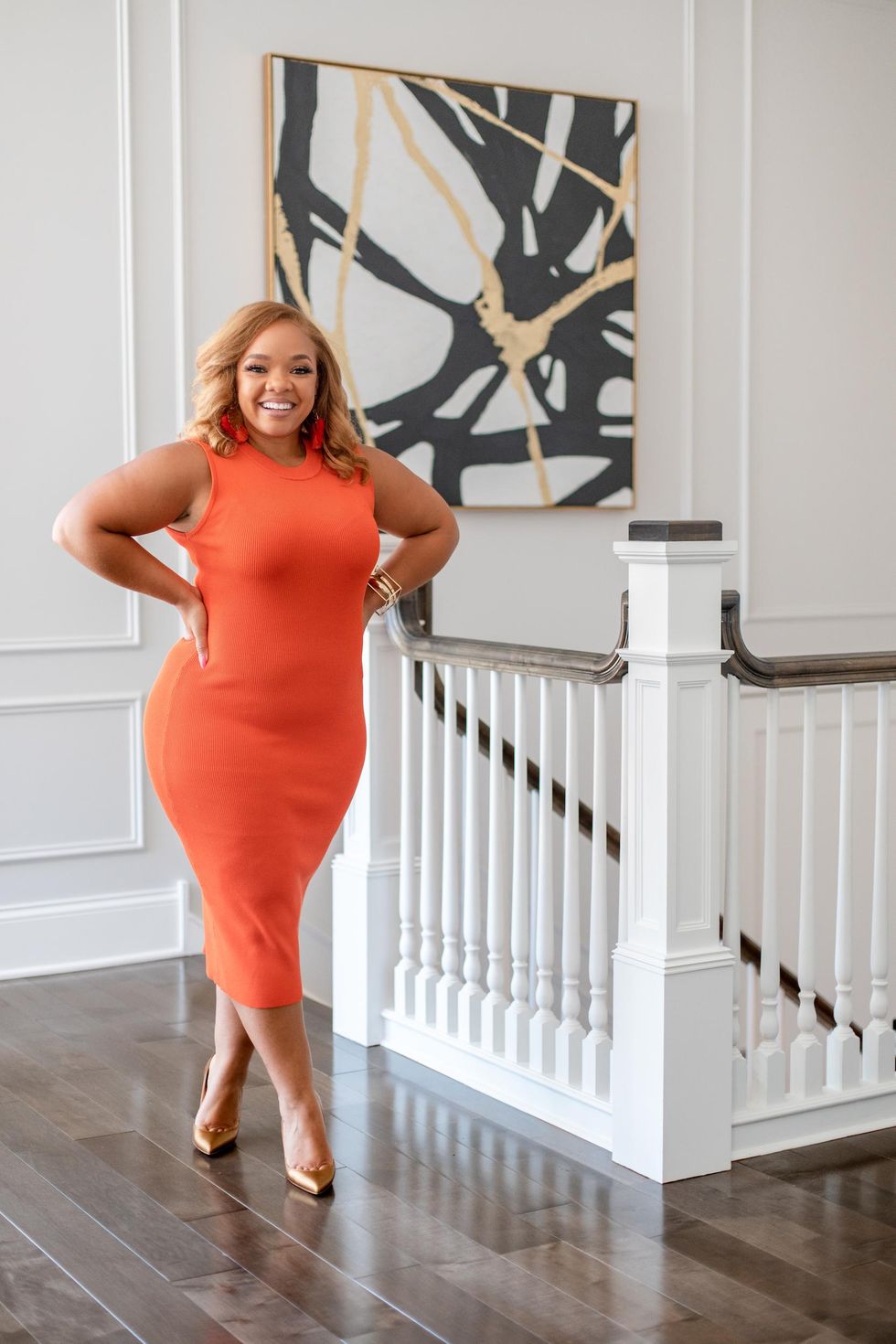
Image courtesy of Candace Junée
It probably wouldn't have happened either if I hadn't invested in a coach to help me make the shift on top of using affirmations and visualization to help me own my abilities and brilliance when I'm doubting.
Here again, fear made me doubt whether I was making the right decision or not because I wasn't fully convinced that my audience would pay those prices—although some of my clients were already paying me four figures monthly for some of the services that I offer. But because I'd managed to reach a level of self-confidence high enough to recognize that I was excellent at what I was doing and understand that my financial situation was only the consequence of me undercharging for my services, I was ready for those who want to work with me to pay premium prices.
The best thing was to realize that I wasn't insane for believing that numbers don't necessarily throw people off. Quite the contrary, they attract the right clients, the kind that can afford your expertise, and therefore make a way for money to flow to you easily.
Wherever you find yourself in your journey, fear is going to rear its ugly head. To me, it's a sign that you're on the right path. You've probably read somewhere that, "If your dreams don't scare you, they're not big enough." I believe that it couldn't be more true. Be willing to bet on yourself and know your value. Trust that anything is possible.
Follow Candace on Instagram @candacejunee.
Unlearning Scarcity To Discover Absolute Abundance
One of the biggest personal breakthroughs I've experienced thus far is realizing the vital value of unlearning. Unlearning the things that hold you back is just as important as learning new [things]. It's necessary to be successful and unlock your potential.
I was a mother at the age of 16 and was raised by a single mother solely responsible for five children. Needless to say, I had to unlearn the scarcity mindset engraved in my head from childhood. Becoming a mother before I became a woman also played a major role in the endless struggles that prevented me from exploring the boss lady hibernating within. Like many, I didn't have a direct example of entrepreneurship; I was raised to play safe and to think that financial stability was something that only Corporate America could offer.
With age and an evolved self-awareness, I began to take risks and explore opportunities I normally wouldn't as a way to overcome those struggles.
In 2012, I relocated from Los Angeles to Arizona after being laid off from a corporate position that I occupied for five years. This move that I considered to be bold truly cultivated the opportunity for me to discover what my passion was. Thanks to Arizona's low cost of living, I was able to quit the new job that I'd found after working there for a year to live off of savings and explore revenue-generating opportunities which I'd hoped would unveil my purpose and passion. Moment of transparency, I must give credit to my supportive husband and his steady income. Without him, I wouldn't have been able to do so.
I tried fashion blogging and freelance writing for local publications. I even dabbled in fashion event production. Although all of that was fun, it wasn't what ignited the fire in me, which is truly what I was seeking. After many failed attempts, I found myself enrolled in a lash extension training class—a $1,300 investment. My lash artist at the time encouraged me to do so because I'd always ask her thousands of questions about how she did mine. Unexpectedly, this training class is where I found my spark.
Back in the day, I wasn't aware of all the doors that would open from just trying something new.

Image courtesy of Chris Bible
Never would I have thought that I'd one day run my own business, let alone work in the beauty industry. But it turned out that lashing was a service that quickly led to the creation of my own training academy and a full-fledged lash product line.
Seeing the revenue that I was generating is partly what helped break the scarcity mindset that I earlier mentioned I was suffering from. What was truly life-changing, I'd say, was practicing daily affirmations as well as investing in a mentor, Pauleanna Reid for instance, salon staff and marketing experts. This is what truly propelled me to my current level of success and showed me that taking control of your daily rituals on top of having an organized process for goal-setting is the difference between having a side hustle and running a six-figure business.
A boss, in my world, is a leader. She has clear morals and values, yet balances that with an attitude that gets ish done by any means necessary. Sacrifice, hard work, and patience are the ingredients to achieve success.
I didn't reach boss status before I made countless mindset shifts, alleviated excuses, welcomed uncertainty with confidence, and followed an unorthodox schedule. Most importantly, I had to embrace that I was worthy and capable of reaching a certain level of success and that it could be done all on my own. Of course, some of these shifts were easier to implement than others, while some were made out of necessity. The hardest changes dealt with inner work and self-love. I struggle with imposter syndrome and reminding myself that I am worthy is a constant fight. Having to embrace who you're meant to be can be frightening but growth never comes from comfort; it thrives in the newest version of ourselves.
Follow Chris on Instagram @sheluvslashes.
When Failure Serves as an Expensive Stepping Stone to Success
I had a huge mindset shift in my early 30s when I launched a business that failed—but from which I recovered. That experience taught me a ton from bringing a dream to fruition to pivoting and iterating.
Five years or so ago, I launched a business with two friends and partners whose purpose was to encourage college students, particularly HBCUs students, to travel the world. My friends and I who are all HBCU grads have had the opportunity to travel abroad when we were younger and being aware of the benefits of doing so, our desire was to give that opportunity to an audience that didn't have the same ability as we did.
We made a ton of mistakes during the launching process. We firmly believed that this project would be the solving of an issue, however, we didn't succeed to shed light on the said issue in a way that resonated with our target audience. We failed to properly grab their attention. And then, we launched too big, way too big—and we actually paid for it.
Looking back, that situation was ironic considering that prior to that, I'd spent a significant amount of time teaching as a product manager—and now as a product management career coach and business coach to women of color entrepreneurs—to actually not do this [launching too big]. It's always best to start small and test your audience first, which is a fact that I was proven once again when I later found myself launching another venture with a pair of two other friends.
For years, we'd casually played a game about dating deal breakers during our girls' nights and wondered if it would be commercially viable. We wanted to create it and then sell it to the public. However, despite how good we thought this idea was, having learned from my past mistakes the hard way, I made it clear from the start that spending any money was out of the question for me; an announcement that caused my friends to glance at me with a confused stare stating that it would therefore not be feasible. But I knew we would figure something out. And we did.
We managed to come up with the simplest launching strategy which cost us the bare minimum but enabled us to maximize our success.

Image courtesy of Miranda Mader
To introduce the game to our audience and test both, we decided to organize a small gathering with our friends. The plan was to play with them so they could see how much fun it is and therefore potentially turn those friends into customers. As for the cards' prototype, my partners and I had opted for at-home printing, a cheap and efficient solution. When the ladies validated our concept that night, we were given the green light to start the next step of our launching process: social media promotion. There again, we'd only invested a few dimes in marketing, just enough to get a decent number of customers to pre-order the deck and allow the real production of our card game to finally begin. We suddenly had the cash to order inventory to cover the pre-orders and more, without taking a hit upfront.
While my initial attempt at entrepreneurship was a complete failure, the lessons that I've learned from our mistakes [not building proper brand awareness and launching too big] are the main reasons why my other partners and I managed to turn this second endeavor into a complete success. I told them that I wouldn't risk losing any more money and adopting such a sales strategy that spared us from buying in bulk without being sure whether we'd sell allowed me to honor my vow.
As I previously briefly mentioned, I now work as a business and career coach. I've been self-employed for approximately two years now, and the services that I offer allow me to generate a six-figure revenue. I believe it's worth noting that the journey hasn't been linear and didn't come without low-grade anxiety. Self-doubt was also ubiquitous; the "will-I-be-able-to-sustain-this-long-term" fear was real. But the thing that I did and which today allows me to say that I'm living a life beyond my dreams was pairing my ability to execute, my vivid imagination, and Godly faith. It's been equal parts of each: envisioning an outcome, believing that it's available to me—which has been difficult because as a young girl, I hadn't met many black women entrepreneurs who independently monetized their talent for the personal and professional benefit of others—, and creating and executing a plan to achieve.
Shifting from fear to possibility has gotten easier over time. I equate it to the first time you tackle a small fear. It's nerve-wracking at first but through repeated actions, it becomes a part of your muscle memory.
Follow Blair on Instagram @blairpres.
Learning How To Cope With Introversion and Impostor Syndrome
My name is Bola Sokunbi, I'm the founder and CEO of Clever Girl Finance, "a mission-driven financial empowerment platform aimed at providing women with the right products and services as well as financial guidance." I'm also a super introverted individual who happens to suffer from impostor syndrome, all of which can be a tad bit problematic when you have high professional ambitions. I wish I could say that these feelings fade away with time and experience, but they don't. However, what the former and the latter did help with was to figure out my coping mechanisms.
Before I started my business, I remember how much of a struggle it was for me to make myself seen and heard when I found myself in important rooms. Instead of being as aggressive as my colleagues were in the pursuit of coveted promotions, I was trying to stay as quiet and as little as possible. I was unable to position myself for further opportunities—and had my advisor not convinced me that the founder of a brand is as important as the brand itself, my inner struggles would've probably prevented my company from growing as well.
One of my biggest challenges was to believe that my story—the story of how I managed to save $100,000, for instance—and accomplishments are valuable enough to be shared with the world. The question that would always pop up in my head was, "Who are you to actually say these things?" When I finally had the guts to put it out two years after the launch of my business, it turned out it became a huge anchor in terms of brand awareness. The exposure my story was given by other media outlets showed me that my fears of being judged were unfounded for people were actually inspired by it, and it also made me realize that what I'm doing is bigger than me.
When I first launched Clever Girl Finance, I used to decline all public speaking appearances and big events that would make me the focal point. Now, because my mindset shifted to thinking of purpose before self and I've learned how to cope with them, I'm able to seize those opportunities.
My secret when it comes to surviving being an introvert plus impostor syndrome as a business owner is to step out of my comfort zone when I need to and step back into it when I can.
When I step out of it, I prepare by repeating affirmations out loud, hyping myself up. I look for an accountability partner, whether it's a friend or my husband so that I have someone to push me and make sure that I do whatever it is that I'm supposed to do. And then, once it's done, I allow myself to rest. Keyword: rest.
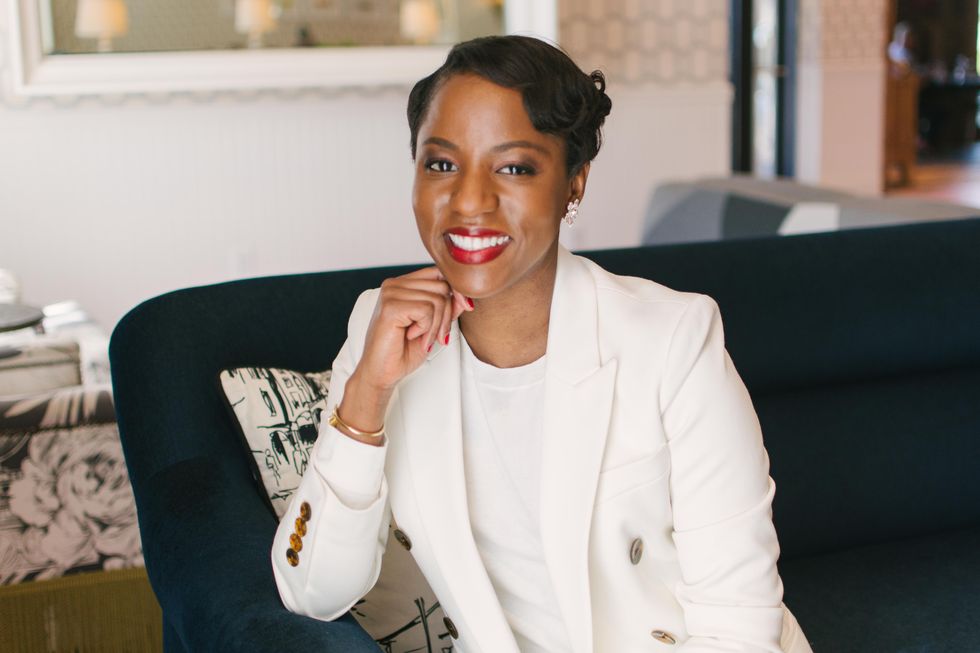
Image courtesy of Caroline Beffa Photography
I came to realize that being an introvert was so much of a struggle for me—not just as a professional but in my daily life as well—because I never took the time to recover after I do an event. Or a video. Or a webinar. Basically, anything that puts me in a place where I'm surrounded by a lot of people.
By not giving myself time to recover, I was just compounding the effect of how much I disliked being out there and being the face of my business. But when I allow myself to step back into my comfort zone and sit there in silence for as long as I need to, I feel rejuvenated and motivated enough to go out and do it again.
Since I discovered the benefits that this technique has on me, 'recovery day' made it to my weekly calendar. It usually occurs on Fridays and to make it possible, I hired a team to help me alleviate the work, take the pressure off of me and allow me to hide for a short amount of time. My staff has been the best at pointing out when I need them to take specific tasks off my plate. Because one thing about introverts, when they don't feel like doing something, that's when a whole nonessential delay game begins and time gets wasted, which is a fortune that as business owners, we cannot afford to lose.
On top of my team, I can also count on my three advisors to help me to be my best self. These ladies, whom I consider my sisters and aunties in my head, make sure to speak life and words of encouragement into me. They also make me uncomfortable, but I like it because the discomfort is private. It's not happening on the public stage, but one thing that's for sure is that it prepares me to stand with confidence in front of my public.
As I said earlier, impostor syndrome and introversion are unfortunately not easy to get rid of—provided it's possible. For me, these are uneasy feelings I'll always have to deal with and I can tell from experience that they evolve with each level that you reach throughout your journey. But there are going to be times when you'll have to tell them to sh*t up because you have work to do. You have a purpose to serve—and recovery day is coming soon anyway, so you can do it.
Follow Bola on Instagram @clevergirlfinance.
Let’s make things inbox official! Sign up for the xoNecole newsletter for daily love, wellness, career, and exclusive content delivered straight to your inbox.
Featured image courtesy of Candace Junée
Originally published on February 19, 2021
- 7 Ways To Turn Fear Into Financial Favor - xoNecole: Women's ... ›
- xoNecole Happy Hour Podcast Credit Money Shame - xoNecole ... ›
- How Garrain Jones Went From A Homeless R&B Singer With Six ... ›
- Money Talks: Princess Lomax, Six-Figure Nurse Practicioner ... ›
- What's Really Keeping You From Your Six-Figure Goals - xoNecole ... ›
- How One Woman Leveraged A $75K Job Offer To Land A Six-Figure ... ›
- Badass Women Inspired Me To Take The Entreprenurial Leap ... ›
- 7 Ways To Attract More Wealth & Abundance In Your Life - xoNecole ... ›
- Dominate Your Decade With These Simple Mindset Shifts ... ›
- 5 Black Women On How They Found Mentors - xoNecole: Women's Interest, Love, Wellness, Beauty ›
- 7 Ways To Turn Fear Into Financial Favor - xoNecole: Women's Interest, Love, Wellness, Beauty ›
- How To Finance A Startup Business - xoNecole: Lifestyle, Culture, Love, & Wellness ›
- Try These Top Six-Figure Jobs For Creatives - xoNecole ›
- How To Make Six Figures - xoNecole ›
- 5 Mindset Shifts That Have Changed My Life - The Blissful Mind ›
- 12 Ways to Shift Your Mindset and Embrace Change | Inc.com ›
- Six-Figure Salary - How To Earn $100,000 or More ›
- What Does A Six-Figure Salary Get You? | Clever Girl Finance ›
- How To Make 6 Figures — No Bullshit. | by Tim Denning | The ... ›
This Is How To Keep 'Holiday Season Stress' From Infecting Your Relationship
Hmph. Maybe it’s just me, but it seems like there is something really weird happening in the fall season air (because winter doesn’t officially begin until December 21) that cuddle season is in full swing while break-up season is as well. In fact, did you know that break-ups are so popular during the holiday season that December 11 is deemed Break-Up Day?
The reasons why relationships shift around this time vary; however, I did both roll my eyes and chuckle when I read that a very popular one is because it’s an easy way to get out of getting one’s significant other a Christmas present. SMDH.
Anyway, I personally think that the less shallow folks out here may contemplate calling things “quits” or they at least distance themselves a bit from their partner (and what I’m referring to is serious relationships) due to all of the stress and strain that oftentimes comes with the holidays whether it be financial, familial, due to their tight schedules or something else.
Listen, I would hate for you and your man to miss the fun and happiness of experiencing this time of year, all because you are so overwhelmed or irritated that you can’t really enjoy it. That’s why I have a few practical tips for how to avoid allowing the typical holiday season stress from INFECTING your relationship.
Manage Your Expectations
 Giphy
GiphyUnmanaged expectations. If there is a main reason why the holiday season tends to be so stress-filled for so many people, I’d bet good money that this is the cause. And when you’re in a long-term relationship, expectations can manifest themselves in all sorts of cryptic and/or unexpected ways. You might have relatives who assume that you are going to be with them for Thanksgiving or Christmas when you have other plans in mind. You might be thinking that you are going to spend one amount for presents while your man is thinking something totally different. When it comes to scheduling, your signals may be crossed.
And you know what? To all of these scenarios, this is where clear and consistent communication come in. Don’t assume anything. Don’t dictate anything either. From now until New Year’s, mutually decide to check in once a week, just to make sure that you are both on the same page as it relates to the holidays and what you both are thinking will come along with it. The less blindsided you both feel, the less stressed out you will be. Trust me on this.
Set (and Keep) a Budget
 Giphy
GiphyOkay, so I read that last year, 36 percent of Americans incurred some type of holiday-related debt. Hmph. Last year, there was still some sense of normalcy in this country, chile, so I can only imagine what finances are gonna look like over the next several weeks. That said, since I don’t know a lot of people who don’t find being broke stressful, make sure that you and your bae set a budget and then stick to it this year — no ifs, ands or buts.
Because really, y’all — it doesn’t make sense to deplete savings and/or max out credit cards for a few days of giggles only to be damn near losing your mind because you don’t know how to make ends meet come Dr. Martin Luther King, Jr. Day.
And by the way, this tip doesn’t just speak to things like food and gifts; I also mean travel. If it doesn’t make a ton of sense (or cents) to be all over the place this year — DON’T BE.
Keep Matthew 5:37 at the Forefront
 Giphy
GiphyIf off the top of your head, you don’t know what Matthew 5:37 says, no worries, here ya go: “But let your ‘Yes’ be ‘Yes,’ and your ‘No,’ ‘No.’ For whatever is more than these is from the evil one.” That verse right there? Oh, it’s a boundaries lifesaver! I say that because do you see “maybe” or “I’ll think about it” in there? Nope. LOL. It says that you should tell people “yes” or “no” and leave it at that — and that complements Anne Lamott’s quote, “’No’ is a complete sentence” impeccably well. Yeah, you’ve got to remember that anything beyond a yes or no to a request is privileged information; you don’t owe anyone details or an explanation.
Besides, if you are really honest with yourself, when someone asks you something and you give a “Umm, let me think about it” kind of reply, more times than not, you already know what your answer is going to be — so why not let you both off of the hook? Give your response. Commit to that. And let everyone (including yourself) get on with their lives and schedules.
I promise you that when it comes to those holiday parties, you are pissing more folks off by not RSVP’ing or doing so and not showing up than just saying, “Thank you but not this year” off the rip.
Remember That Your Personal Space Is Privilege Not a Right
 Giphy
GiphyA friend of mine recently bought a new house and invited me over to come see it. He’s a single man with no children, so as I was taking in all of the space that he had, especially as I walked through his finished basement, I joked about relatives coming to live with him. “Hell no” and “absolutely not” were pretty much his immediate responses as he went on to say that some folks even had the nerve to be offended when he told them that he had no intentions on taking DNA in.
Ain’t it wild how people think that your stuff is their right? And yes, that brings me to my next point. Your home is your sanctuary space. If you want to host folks this year — cool. If not, ALSO COOL. Please don’t let folks (family included) guilt you into how they want you to act or even into what they would do if the shoe was on the other foot. You are not them — and as one of my favorite quotes states, “If two people were exactly alike, one of them would be unnecessary.” (A man by the name Larry Dixon said that.)
Hell, my friends? They know that I am good for sending them random things that they need or even want all throughout the year. Coming over to hang out at my pace, though. Uh-uh. Chalk it up to being a card-carrying member of the ambivert club yet I like keeping my living space personal — and I sleep like a baby, each and every night, for feeling that way.
Always remember that your space, your time, your resources, your energy and shoot, yourself period (including your relationship), are all things that are your own. You get to choose how, when and why you want to share them. The holiday season is certainly no exception.
Cultivate Some “You Two Only” Traditions
 Giphy
GiphyIt’s not uncommon for some couples to hit me up after the holiday season to “detox.” Sometimes it’s due to the financial drama (and sometimes trauma) that they experienced. Sometimes it’s because they allowed their relatives (especially in-laws) to get more into their personal business than they should’ve. More than anything, though, it tends to be because they didn’t get enough quality time together and so ended up feeling “disconnected.”
Please don’t let that happen. Listen, I’m not even a holidays kind of woman and yet, I will absolutely sit myself down with some hot chocolate and chocolate chip cookies to enjoy a Hallmark holiday film or two. Aside from the fact that most of them are lighthearted and sweet, I also like that they usually focus on couples loving on each other amidst all of the holiday beauty and ambiance — which is something that all couples should set aside some time to do.
Maybe it’s a vacation. Maybe it’s a staycation. Or maybe it’s my personal favorite, A SEXCATION. Whether it’s for a few days, the weekend or even overnight — don’t you let the holidays go by without setting aside time for you and your man to celebrate one another. Don’t you dare (check out “Are You Ready To Have Some Very Merry 'Christmas Sex'?”).
GET. SOME. REST.
 Giphy
GiphyI once read that 8 out of 10 people get stressed out over the holidays and 3 out of 10 lose sleep during to it — and when you’re stress-filled and sleep-deprived, that can absolutely lead to hypersensitivity, making mountains out of molehills and even not being in the mood for sex.
Your relationship can’t afford to go through any of this, so definitely make sure to prioritize rest. I don’t care how unrealistic it might seem during this time, sleep should never be seen as a luxury; it will always and forever be a great necessity.
That said, try to get no less than six hours of shut-eye in (check out “6 Fascinating Ways Sex And Sleep Definitely Go Hand In Hand”) and even ask your bae to take a nap with you sometimes (check out “Wanna Have Some Next-Level Sex? Take A Nap, Sis.”). Not only will sleep help to restore your mind, body and spirit but, when it’s with your partner, it’s an act of intimacy that can make you both feel super connected, even in the midst of what might feel like chaos.
___
Holiday season stress is real. Still, never give it the permission or power to throw your relationship off. Put you and your man first and let the holidays be what they are gonna be, chile.
Let’s make things inbox official! Sign up for the xoNecole newsletter for love, wellness, career, and exclusive content delivered straight to your inbox.
Featured image by Shutterstock
How To Avoid Being An Emotionally Impulsive Spender This Holiday Season
Geeze. Can you believe that we are just a few days out from another Christmas? Yeah, me neither. In fact, because I’m not a holidays person myself (check out “So, What If You Don't Observe Holidays?”), it wasn’t until one of my clients was venting about how stressed out she was due to all of the holiday season procrastinating that she had been doing that I realized just how fast December is actually flying by.
If, like her, you’re feeling frazzled because, although you told yourself last year that you weren’t going to wait until the last minute to “handle your business,” you ended up doing exactly that, fret not. I’ve got 10 tips that can keep you from making emotionally-triggered decisions as far as your financial expenses are concerned. Merry Christmas. #wink
1. Create a Budget. Stick to It.
 Giphy
GiphyBudgets, boy. I recently read that one of the reasons why they don’t work for a lot of people is because many folks don’t have a clue about how much money they spend on a monthly basis to begin with. SMDH. That said, at the end of the day, it’s important to remember that a budget is simply setting boundaries/limits on your spending — and being intentional about moving in this fashion is always a wise move; especially when it comes to this time of the year…especially being that it’s typical for half of all Americans to take on some type of holiday season debt with 17 percent needing six (or more) months to pay it off.
Know what can prevent this kind of financial chaos? A SPENDING BUDGET. Tips for how to create one of your own this year can be found here.
2. Never Shop When You’re Stressed or Pressed
 Giphy
GiphyYou know how they say that it’s not a good idea to go grocery shopping when you’re hungry? Although the holiday season can be a stressful time, avoid shopping for gifts (or décor or food for recipes) when you are feeling stressed out or pressed for time. More times than not, that cultivates anxiety which could cause you to either purchase things that you don’t really want or to spend money that you don’t really have (P.S. If you’re relying on credit cards, that qualifies as money that you don’t really have. Just sayin’).
3. Don’t Keep Up with the Joneses
 Giphy
GiphyKnow something else that can stress you out: trying to keep up with the Joneses. And y’all, now that we have social media, the reality is that envy is at an all-time high. That’s because it can be really easy to watch holiday engagements, holiday trips and folks bragging about the things that they’ve received in times past, only for you to find yourself wishing that you were them — or putting pressure on yourself and those in your world to keep up.
Listen, it is King Solomon who once said, “So are the ways of everyone who is greedy for gain; It takes away the life of its owners” (Proverbs 1:19 — NKJV) and “A sound heart is life to the body, but envy is rottenness to the bones” (Proverbs 14:30 — NKJV) and he’s considered to be the wisest man who ever lived (during his time — I Kings 4:30). Yeah, both of these verses are a spiritual reminder that whatever you are planning to do or give, do it out of the goodness of your heart — not so that you can low-key “outdo” the next guy.
4. No Need to “Tit-for-Tat”
 Giphy
GiphyThis one might be a bit controversial yet I’m totally okay with that. I don’t care what the occasion is, no one is OWED a present. A gift is a voluntary token of one’s appreciation or affection. That said, if you decide to give someone a present this year, don’t automatically expect something in return. If you get something, cool. If not, if you were giving for the right reasons, it really shouldn’t matter (RIGHT?). On the flip side, if someone decides to get you something and you don’t have something to offer in return, also cool.
Other than going to someone’s home for a holiday dinner or party, for anyone to feel like they should have something in hand because someone else does…that’s not giving, that’s competing — and that absolutely should not be the spirit that you are in (or around) during this time of year.
Again, a gift is not an obligatory thing. If you’ve always thought otherwise, it’s time to do some serious reprogramming.
5. Avoid the Pressure to Buy for Lots of Adults
 Giphy
GiphyLast month, Newsweek published an article that said it’s wise to not spend a ton of money purchasing gifts for adults. A financial expert in the piece said that it’s best to buy for kids because, more times than not, you’re going to get adults something that they already have a lot of, they don’t really need or they’re not going to use (beyond maybe regifting) anyway.
If you’re not feeling that insight, my take would be to exchange names and set a price cap for the grown folks. I say that because, I don’t think that people ever outgrow wanting something over Christmas. It’s just that the over-the-top energy should be reserved for the kiddies — and even then, the “4-gift rule” (want, need, read, experience) is probably your best bet for them…financially and otherwise.
6. Go for Thoughtful over Expensive
 Giphy
GiphyIt’s kind of wild how much close-to-torture folks send themselves through to purchase gifts that, a good 6-8 months now, most folks aren’t even going to remember. That’s why it’s also a good idea to purpose in your mind to get something thoughtful over expensive.
Honestly, that’s a big part of the reason why Etsy continues to be a go-to for gifts (for every occasion) for me. It’s because you can oftentimes get things customized/personalized which ends up meaning so much more to people than something that you bought at a generic department store that might have a high price tag yet still lacks in sentimentality and deep meaning.
7. Use Coupons and Promo Codes
 Giphy
GiphyCoupons (and promo codes) are a slippery slope in the sense that…they remind me of when I used to go overboard while thrift store shopping. I say that because, just because I might find several bomb dresses for under $20, what am I going to do with 50 of ‘em (over time)? It’s just as much of a waste of money as buying couture if neither option gets much use.
And that’s kind of the thing about coupons and promo codes. Some people end up overspending because they rationalize that so long as there are discounts attached, it’s all good. At the same time, this doesn’t mean that you should forego coupons and promo codes altogether. The key is to put together your shopping list (and budget) and then use discounts specifically for those items. If you do this, you could save well over $1,000 annually (at least, depending on what you decide to buy).
8. Avoid Add-Ons
 Giphy
GiphyYeah. Dodge add-on expenses. Add-ons like what? The first thing that comes to my mind is a warranty. What’s the chance that someone is actually going to need that? Another example is paying for things to be “professionally” gift wrapped. Chile, throw that stuff in a gift bag with some tissue paper and go on about your day. All good.
9. Rethink Gift Cards
 Giphy
GiphyIf there is any time of the year when there is a noticeable hike in gift card purchases, now would be it. And although they are a convenient approach to gift giving, at the same time, many come with hidden fees, the full amount oftentimes goes unused (which ends up being a waste of money) and they do come with expiration dates that are oftentimes forgotten.
So, if you’re someone who likes to wait until the last minute to do your holiday shopping, resist the urge to impulsively pick up a handful of gift cards. Unless it’s to a place that you know someone is going to use within the next few months, they could end up in somebody’s kitchen drawer for the next couple of years. And what a waste that would be.
10. They’ll Get It When They Do. And That’s Okay.

=
GiphyOne more. Although it is super thoughtful and proactive to get people their gifts in time for whatever occasion you purchased them for, if trying to reach that goal is going to require paying for rush shipping that is damn near as high as the price of gift or spending a lot of gas money that you don’t have at the moment to drive miles and miles away — take the pressure off to spend a ton of cash just to make sure that something arrives at December 25. Listen, through doing business with Etsy, I have learned that through this administration, there are all sorts of tariff issues going on and the USPS is slower than ever too, so paying more may not guarantee much.
The hack? Send a message that something special is coming…soon enough. The thought really is what counts (more times than not); plus, it builds anticipation of something good coming, even if it’s after all of the Christmas Day hoopla. And no one (with sense) is going to have a problem with that.
Now don’t you feel better? Happy Holiday Shopping, sis.
Let’s make things inbox official! Sign up for the xoNecole newsletter for love, wellness, career, and exclusive content delivered straight to your inbox.
Featured image by Shutterstock



